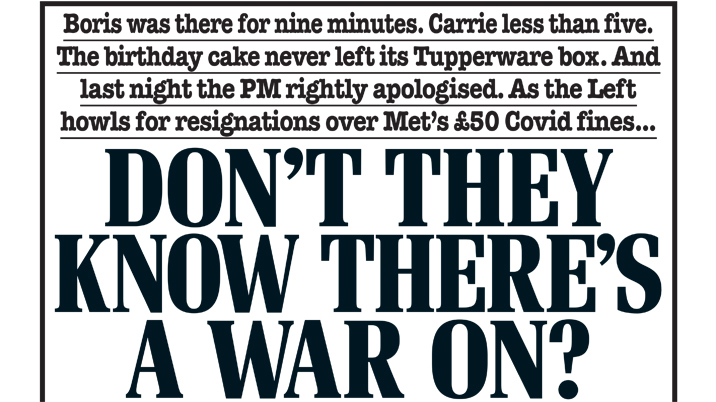
Don’t they know…
I have no crystal ball, but I knew exactly what yesterday’s Mail headline would be. Indeed, opening this Word document, I see that my note from when the fines were announced on Tuesday says: “Partygate; don’t they know there’s a war on?”
Ever since the scandal broke, the Mail’s line has been consistent: “Yes, it was wrong, yes, we all suffered. We don’t want to minimise the anger, but move along here, there are more important things to worry about.” In other words, it has not only minimised the anger, but it has underestimated, discounted and generally brushed aside that anger – and completely ignored the bigger threat to the Prime Minister’s position: did he knowingly mislead Parliament?
Yesterday’s front page minimised not only the anger, but also the “crime”. The PM was there for only nine minutes (it’s important to say nine, rather than ten, as it’s so nicely precise and short. “Ten minutes” could mean 12, which could stretch to quarter of an hour, and once the word “hour” has appeared, who knows where this could end up?), the cake stayed in its Tupperware container, the beer wasn’t opened.
It’s hard not to agree that it does seem a bit minor and it’s hard, even after everything we’ve learnt about the Chancellor this week, not to feel sorry for Rishi Sunak, who appears just to have turned up for a meeting and found himself at a “party”. Come on, it may have broken the guidelines – at that time enshrined in law – and Carrie and Lulu shouldn’t have been there, but it clearly wasn’t anything any normal person would recognise as a “party”.
This, therefore, was probably the least of Boris Johnson’s Partygate worries. We know that there were other events in Downing Street that, by any definition, were surely parties and clearly recognisable as such. One was organised by the Prime Minister’s PPS and we know that Johnson was there for 25 minutes (note the precision again – not half an hour). Fines have yet to be issued for that occasion, but if Johnson is again found to have broken the rules, he should have to pay twice as much for that, since penalties for breaching Covid restrictions doubled with each offence.
In all, the Met are looking into a dozen gatherings and the Prime Minister is said to have put in an appearance at half of them. It’s one thing for the Mail to shrug off a single fine, but it might struggle to play the “only just popped in” card for every one. And if Carrie is found to have hosted an illegal Abba-singalong celebration in the flat after the departure of Dominic Cummings, she could be in for a £10,000 hit. This investigation has a way to go – and when it’s finished, there’ll be the Sue Gray report.
Changing leader
So, the key line yesterday simply had to be “Don’t they know there’s a war on?” – a question that has its roots as a Second World War putdown to anyone who dared to complain about anything. It would be folly to change leader now, the argument goes. But there’s always a war on. So by that token we’d never change leader. Should the French be abandoning their presidential election?
We are not at war. We are not participants in this conflict any more than we are in Yemen (although we are arms suppliers in both). We may care more about Ukraine than Yemen, but Britain has a policy on both – and it is no more likely to change its approach to Ukraine than it is to Yemen, regardless of whichever Conservative MP happens to be the tenant in 10 Downing Street. Even with an ongoing leadership contest, we would not suddenly abandon our Western allies for a few months of internal politicking.
And, of course, if we were actually at war, that would still not preclude a change of leader. We switched from Asquith to Lloyd George halfway through the First World War and from Chamberlain to Churchill in the second. And in this century, we went from Blair to Brown to Cameron to May and finally to Johnson while our troops were fighting in Iraq and Afghanistan.
There may be arguments in favour of keeping Johnson in place, “don’t they know there’s a war on?” isn’t one of them.
The wheels of diplomacy would carry on turning. It would be the press, not the government, that would be distracted.
Love him / loathe him

So much for the Mail, what about the rest? I found it interesting to see the way the other front pages reflected the degree of affection in which they hold the prime minister. The Mirror and Star both denounce him as a shameless liar; the Guardian, i and Times hold him in restrained contempt, focusing on his refusal to resign; the FT and Metro play it straight on the issuing of the fines, while the Independent portrays Downing Street as “the scene of the crime”.
But then, as we come to his friends at the Telegraph, Express and Sun, the angle shifts to his apology and promise to do better. These last three put me in mind of the response to the 100,000th Covid death when most papers had a picture of a sombre Johnson saying how sad he was.
For some, Johnson can do nothing right. For others, the story never seems to be about who has been hurt or let down, but always about how sad and sorry Mr Johnson feels, about how he is doing his best and about his promises to try to get it right next time. You have to admire their faith.
And also their new capacity for forgiveness. Remember the treatment meted out to Allegra Stratten, who resigned after laughing about the No 10 cheese and wine party, to “Cheater Ora” who had 30 people at her “30th birthday bash”, to Sky presenters Beth Rigby and Kay Burley, who were taken off air for six months after going to a restaurant to celebrate Rigby’s 60th birthday, to all those footballer covidiots.
It’s good to know our papers have at last discovered some compassion for transgressors.

The two papers for whom Johnson absolutely can do no right are, of course, the Guardian and the Mirror. They’ve had plenty of ammunition in the years of his administration, but sometimes you need to know when to change tack. This morning both splash on the point made above, that he could face more and heavier fines. Er, that’s not exactly Holmes-level deduction or (whatever the Mirror strapline may claim) exclusive breaking news.
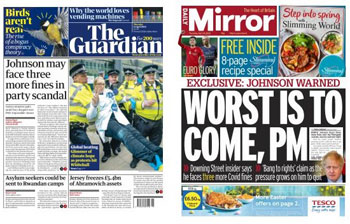
The big political story of the day – as almost everyone else recognised – has to be the signing of the deal to send asylum-seekers to Rwanda. This actually means that if a Ukrainian fleeing war crimes and genocide in her own country got on a little boat to seek refuge in our haven of democracy, she would be sent 6,500 miles for “processing” in a country with a history of war crimes and genocide.

But that sort of story wouldn’t be of any interest to Guardian or Mirror readers. Would it?
Sunak’s non-dom woes
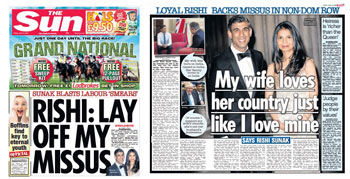
We’ll have to wait to see how the Mail reacts as the Partygate investigation unrolls and how the public express their anger or support for the Tories in the local elections next month. Will it play the same card again – as in “Don’t they know there’s a war on Part Two”, which has precedent? Will it get redder in the face or will it find itself in retreat? If the latter, at least it will have time on its side, unlike the Sun, which demonstrated the perils of going all-out (or all-in) on day one, in its coverage or Rishi Sunak’s domestic financial arrangements.
When the Independent’s Anna Isaac broke the story of Akshata Murthy’s non-dom status, the Sun came out fighting for the Chancellor with a splash headlined “Lay off my missus”. These were all “Labour smears” to get at him; his wife hadn’t broken any rules; it wasn’t about paying less tax; people didn’t understand the system. What a time to bag an exclusive interview with the man of the moment. This was bound to put the “scandal” to bed.
It all unravelled so quickly.
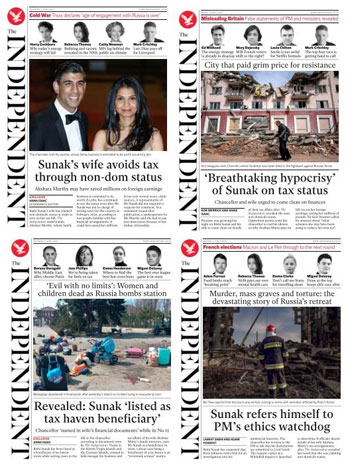
Face value
The Sun took everything Sunak told it at face value and didn’t bother to find out – or to tell the reader – whether there was really a mandatory link between Indian citizenship and non-dom status (there isn’t). Then came the quick “I’ll pay taxes here after all” statement. Then the green card embarrassment. And the trip to California last year. Oh dear.
Had Mr Murdoch been planning to anoint Sunak as Johnson’s successor? The Times also splashed on him claiming that he was the victim of a “hit job” – although here eyes were on the neighbours rather than the opposition. Meanwhile its star writers were squabbling over whether a rich man should be Chancellor. Caitlin Moran devoted a Saturday column to saying that if you hadn’t been poor you could never understand what it was to go without and that a gazillionaire shouldn’t be in charge of the nation’s finances; Matthew Parris came back the next week saying that was preposterous.
They both had a point. We pay our Chancellors about £150,000 a year, so even without private wealth, they are all by definition going to be better off than people dependent on benefits and food banks. You don’t always have to live in someone’s shoes to appreciate their problems. But Mr Sunak does seem to have missed the mood – and the point – a bit over the past month. That forecourt photocall, not knowing how to pay for a Twix, launching a leak inquiry into Isaac’s series of exclusives, rather than addressing the central issue. None of these was a good move. And nor is it a good look to be applying to build a gym at one of your four expensive houses in the middle of a cost-of-living crisis that leaves people having to choose between heating and eating. The Sunaks denying themselves these little indulgences wouldn’t make a jot of difference to the country’s finances. But, to paraphrase Macmillan, the trickiest thing for politicians today is optics, dear boy, optics.
You don’t always have to live in someone’s shoes to appreciate their problems.
Tory MPs: take your pick
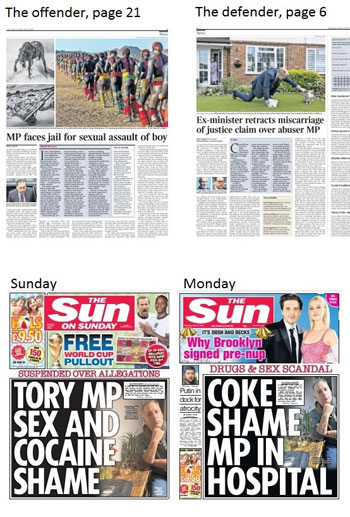
It hasn’t been a good couple of weeks for Tory MPs. Quite apart from Rishi’s riches and Boris’s bashes, David Warburton has been suspended for alleged sexual harassment (splash in the Mail on Sunday and Sun), Crispin Blunt has been forced to apologise and retract for defending a sex abuser (page 6 in the Times, Telegraph and Mail), and Imran Ahmed Khan has been expelled from the party after being guilty of sexually assaulting a teenager.
You might think that the latter is the biggest of the three scandals. But Khan’s conviction received much less attention than Blunt’s sin of defending him. It made page 21 of the Times, 9 in the Telegraph and wasn’t mentioned at all in the Mail until Blunt spoke out. The Express, Star, Sun, Guardian and Mirror all reported the court case, but the furthest forward it made in any paper was page 4. The Mirror gave it 160 words, the Star 180 and the Sun 215.
I find this extraordinary. Particularly in the context of Warburton, who made the splash on successive days for the Sun (with “deja-vu” layouts), and who was clearly more sinned against than sinning in the eyes of the MoS (in spite of the picture of him with lines of cocaine), which angled its lead on a “sting” and then ran a spread inside asking “was MP victim of a hostile power?”.
Strange priorities.
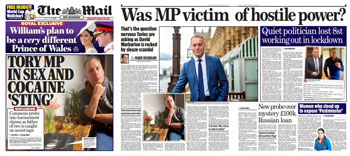
Women’s health
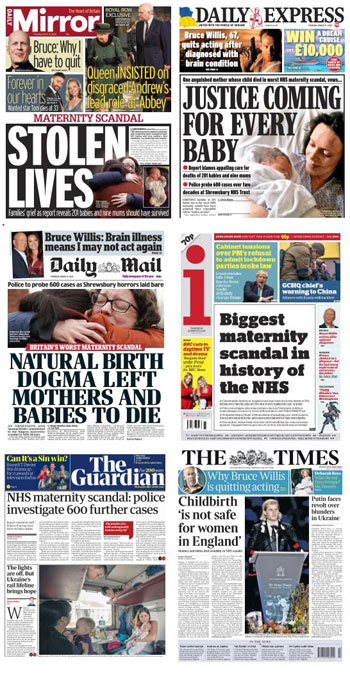
More strange priorities on show at the Telegraph. Two weeks ago, most papers led on an official report into the avoidable deaths of 300 babies and how the negligent health trust had blamed mothers for their disastrous birth experiences. It concluded “childbirth is not safe for women in England” and was categorised by the i as “the biggest maternity scandal in the history of the NHS”. That view was reinforced by another top-of-the-front story in the Times on Monday, declaring that almost half of the country’s maternity services were unsafe.
Pretty scary, eh? Something that directly affects half the population and indirectly all of it. But Telegraph readers had to wait until page 10 to learn about this. The health of our rivers and Bruce Willis’s brain were among the more pressing stories – along with easier at-home abortions. I can’t express my bewilderment any better than an old friend did in an email: “Women are currently not safe in childbirth anywhere in the NHS? What? Read that again. And the Telegraph deems this jawdropper not worth a par on page one, even though it finds room for some dross about an avocado a day keeps the cardiologist away. Or am I looking at some fancy French version of the paper which has a policy of no news on the front page?”
Sadly, it was not just the French edition.
PS: That squashed “Natural birth dogma” headline in the Mail is a crime against typography.
Channel 4 privatisation: for and against
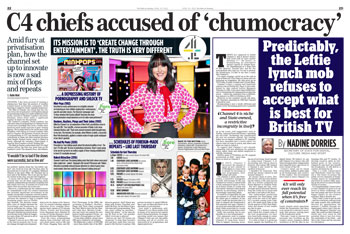
There has been much foot-stamping across the media about the proposed privatisation of Channel 4. It’s been hard to find people, from anywhere on the political spectrum, with a good word to say about the idea. Former Scottish Tory leader Ruth Davidson deemed it “very unconservative”, several organisations have homed in on the same phrase “cultural vandalism”.
So I guess it was helpful to have culture secretary Nadine Dorries spell out her thinking in the Mail on Sunday. Her column accused opponents of sneering that she wasn’t smart enough to understand the channel (she had to be corrected by fellow Conservative Damian Green after asserting that it was in receipt of taxpayers’ money) and urged us to “dump the lazy, overwrought and ill-informed rhetoric from the leftie luvvie lynch mob”. C4 needed private investment so that it could compete with the likes of Netflix and Amazon Prime. Independent production companies would not suffer, but thrive as a result of a sale.
This piece ran on a spread alongside a main story accusing Channel 4 chiefs of operating a chumocracy. This was predicated on links between two C4 execs and the heads of two “wealthy London-based production companies”. One had sold 25 shows to C4 “in recent years”, the other made the “little-watched” Steph’s Packed Lunch (which is filmed in Leeds). Then there was a montage of some of the network’s less tasteful offerings.
Dorries’s decision to go ahead with the privatisation was announced six months after the closure of a public consultation set up by her predecessor, Oliver Dowden. That consultation received 60,000 submissions, but the government has yet to publish them, so we have no way of knowing whether they came down in favour or against the idea. The fact that many objectors have independently made their views known – and that disinclination to publish – suggests the weight of opinion was probably against. But even if it were in favour, would it not be basic journalism to outline some of the concerns about the policy, beyond allowing the minister a swipe at “leftie luvvies”? And what about context? To say a studio has sold 25 shows “in recent years” means nothing. How many recent years? How many shows does the channel buy? If it were 25 out of 26, it would be a scandal; if it were 25 out of 2,500, it would be “so what!”
Would it not be basic journalism to outline some of the concerns about the policy, beyond allowing the minister a swipe at “leftie luvvies”?
The trans debate
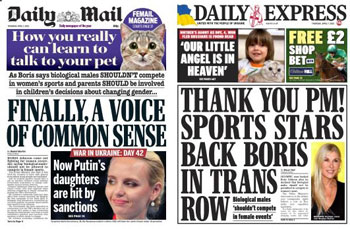
There was a similar absence of the alternative voice in the whitetops’ coverage of the Government’s back-tracking on conversion therapy. There was also a swerve down a side alley, which was then presented as the motorway.
Last week, the Government announced that it was outlawing conversion therapy with regard to gay and lesbian people, but not for trans people. This, the prime minister said, was because the latter was a more complex issue; one of gender rather than sexual orientation.
Well yes. The whole trans policy landscape is a minefield. Why should people who have been brought up caught in the “wrong” gender and endured all the mental torture that entails have to continue to suffer when their bodies finally match their minds? Why should people born male with all their tackle intact be able to self-identify as women and march into the ladies’ loo?
So many forests have been felled to document the battles between the “radfems” and the “trans lobby” and to rehash the case of the self-identifying rapist who got sent to a woman’s jail and proceeded to attack other inmates. Yet so little of the paper from those fallen trees has been used to explain exactly how many people all this affects or to offer case studies of trans people trying to live normal lives.
But conversion therapy must be worth a bit of attention surely? Trying to “treat” people into being what they aren’t? Doesn’t the mere name make you think “that can’t be good”, whoever it applies to? My suspicion is that Boris Johnson understands that, and that was why he blustered about it being “more complex”, and then started talking about who should and should not be allowed to compete against whom in sports.
Common sense?
And so we ended up with “Finally, a voice of common sense” in the Mail and “Thank you PM! Sports stars back Boris in trans row” in the Express – in other words, the Prime Minister’s personal opinion on something over which he has no power became the focus, rather than an examination of the policy he is actually implementing.
This was all part of a mini-campaign for the Mail, which had started three days earlier with a “huge victory for women’s rights”, welcoming the equality commission’s guidance that organisations should be able to offer single-sex facilities, and was followed up the next day with another splash on Sajid Javid saying he thought women-only wards should be protected.
Single-sex wards have been a “we must protect this at-risk service” for newspapers for as long as weekly bin collections – way back before gender identity became a matter of public debate. I don’t want to share a hospital ward with men, but not because I feel threatened by them. I am dead against loos for all, but again not because I feel threatened. I think the odds against some bloke putting on a dress just so he can come and peer at me over the top of a cubicle are pretty high. No, it’s more practical than that. Going to the loo is more of a palaver for women, it takes longer, we have to queue. Women can’t use urinals, but men can use cubicles, so it’s win-win for men, lose-draw for women. We end up queueing longer - quite apart from the risks of having to use smellier (think about it: why might men prefer to use the cloakrooms with more cubicles?) or wetter (poor aim) facilities.
But to put all this on the backs of trans people who, for the most part, just want to live their lives is not really fair.
Which takes me back to the missing voices. Much coverage – not only in the whitetops, but particularly in the Times and Telegraph – talks about the “trans lobby” and Stonewall and “extremists”, but rarely directly quotes any of them and never gives a voice to “ordinary” trans people who are absolutely not out to deny biological women their hard-fought rights. These are issues that are hugely important to a small minority and really don’t impact on the lives of the great majority, yet they are presented as a threat to the entire societal edifice.
That copy of the Express was particularly one-sided. In a splash and spread, it had just one sentence saying Stonewall thought the EHRC guidance on single-sex facilities would lead to more discrimination. That was the only LGBTQ+ contribution to the entire coverage. There was, however, space for a panel taking a pot-shot at Labour politicians offering different definitions of “woman”, under the headline “As clear as mud…Labour’s view”.
Because bashing Labour is definitely the most important thing here.
These are issues that are hugely important to a small minority and really don’t impact on the lives of the great majority.
Just like old times

I suppose it was quite an adventure for the Express to go down this route at all because gender politics are hardly its usual fare. Maybe it was the opportunity to say “thank you Boris” yet again.
Apart from its slavish devotion to the Prime Minister and obsession with pensions (its “triple lock is back” celebration lead last week was an interesting way to report a projected 7.4% inflation rate), the paper has all but abandoned its traditional splash sources. But April 1 brought a bit of nostalgia with “House prices surge £33,000”. According to this, prices were rising at the fastest rate for 18 years. Which is obviously wonderful news – a “boom” and a “bonanza” – if you’re sitting in a mansion and maybe planning to downsize and cash in. But perhaps not so great if you’re struggling to get on the ladder, finding it difficult to save as food and fuel prices rise, and faced with the prospect of higher mortgage rates if you do raise enough for a deposit.
Also back on the front page…
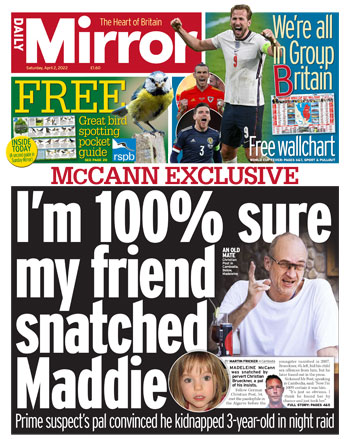
The Express was not the only paper to reach for the tried and tested last week. The next day was one of those occasions when there was no stone-cold lead, so everyone went off in different directions. The Mail and Express had different Andrew stories, the Times was at war, the Telegraph concerned about wind farms, the Guardian about Covid and the i about the cost of living.
Old rivals the Sun and Mirror both reached for the familiar. The Sun went for the safety of football and the World Cup draw “It’s Iranian men, hallelujah!” while the Mirror had someone “100% sure” that they knew who took Maddie.
Oh dear. Apart from Gerry and Kate, does anybody really think this is a story any more?
June Brown
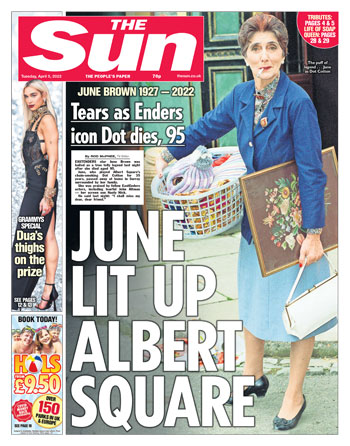
My non-existent crystal ball failed me when it came to the death of June Brown – and I’m so glad it did. She was obviously going to be the lead for the tabs, and I feared that they would come up with “RIP Dot” type headlines – the Sun in particular has an irritating habit of referring to actors by the names of the people they play. In this case, to mourn a fictional character would have been disrespectful not only to Ms Brown, but also to the thousands of real people dying in Ukraine.
How pleasing to have been proved wrong.
Front page of the fortnight
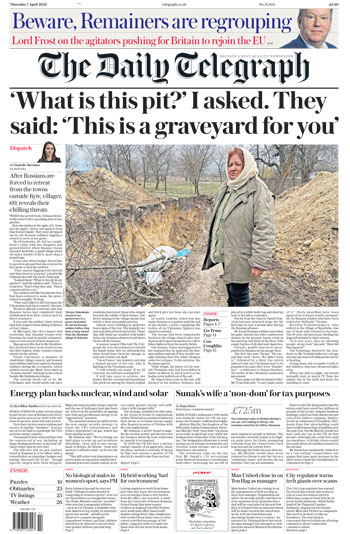
Apart from “Don’t they know there’s a war on?” headlines, domestic issues have overtaken Ukraine on the front pages over the past couple of weeks. But the conflict is still breaking through, especially with reports of atrocities such as that in Bucha, which seems almost certainly to have been the scene of terrible war crimes – the Mirror called it genocide, the Times wrote of civilians being shot in the streets.
I always love a full-throated poster cover, so the broadsheets tend to be under-represented in this slot. But this time I have gone for this not-very-dramatic picture and its oh-so-compelling headline. Even with all that punctuation, the combination packs a real punch.
So yes, in reply to my friend in France, they do still put news on the front of the Telegraph. Sometimes.
Liz Gerard’s Notebook is a fortnightly column published in the InPubWeekly newsletter. To be added to the mailing list, enter your email address here.












